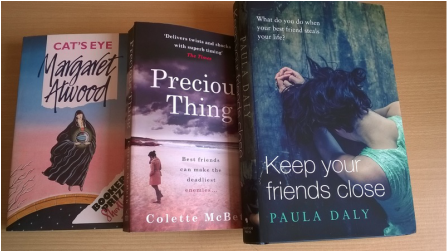
Clara and Rachel, the ill-fated best friends in Precious Thing by Colette McBeth, first meet at fourteen, slap in the middle of messy adolescence. Inseparable until Clara mysteriously goes away at the end of their teens, when they meet up again in their late-20s, their roles are reversed: Clara, the previously charismatic one, is insecure, while Rachel, the dumpy awkward teen, seems to have it made with the boyfriend, smart flat and successful media career. What I liked about this novel was that, while it’s narrated primarily from Rachel’s point of view, the reader is left to read between the lines to make up her own mind of which of the two women is the most poisonous.
In Keep Your Friends Close by Paula Daly, the psychopathic Eve is certainly the villain of the piece, but Natty is no angel either, and is prepared to give as much as she gets. The two women met at university at the end of their teens and have kept in touch, despite living in different continents, for fifteen years before Eve seizes the opportunity of Natty’s temporary absence from the home to take over husband, house and life. The reader wonders just how far these women will go, as the author makes things progressively harder for her characters, until the surprise but satisfying ending, which neatly ties up several plot threads.
While both of these novels are page turners and, with one a debut and the other second novel, it would be unfair to expect them to be as faultless as Cat’s Eye, but in neither of these was I totally convinced that the women’s friendships would have endured the way they did. Although in Precious Thing the reason for the hiatus in, and re-establishment of, the friendship becomes clear towards the end, and reassessing the past is part of the plot, my scepticism did impinge on my enjoyment of the early chapters. In Keep Your Friends Close we are given a rationale for Eve’s extreme behaviour, yet I wasn’t altogether convinced. However, this may simply reflect my preference for novels with a stronger emphasis on character than plot. I also wondered if the difference in the ages at which the girls/women got together affected how credible the unbalanced relationships seemed; I know we can be duped at any age, but perhaps those early friendships are the most risky.
You can check out my own limitations in writing about female friendship among children in my short story Jessica’s Navel and among adults in my short story The Good News.
What’s your experience of dodgy female friendships in fiction and/or real life? I look forward to your comments.
Thanks to Headline Review for my copy of Precious Thing and Alison Barrow at Transworld books and Sonya from the blog A Lover of Books for my copy of Keep Your Friends Close.





















 RSS Feed
RSS Feed





















